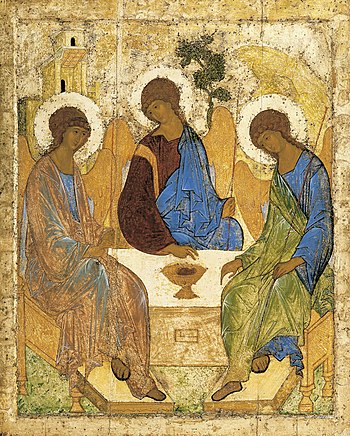The Holy Spirit
 |
| Andrei Rublev's Trinity, representing the Father, Son and Holy Spirit in a similar manner. (Photo credit: Wikipedia) |
The Holy Spirit, though more “visible” in the New Testament, was also at work in the Old. He was present at creation, hovering over the face of the waters, poised to order and complete what the Father had purposed and planned (Gen. 1:2). The Holy Spirit was instrumental in the exodus (Isa. 64:7–14). He gifted God’s people for service, equipping Bezalel and Oholiab not just with artistic excellence but with the Spirit’s power to reshape a kind of heaven on earth (Ex. 35:30–35). We see frequently how the Spirit in the Old Testament rested on individuals like Balaam, Gideon, Jephthah, Samson, and Azariah for special acts of speaking or acting (Num. 24:2; Judges 6:34; 11:29; 13:25; 14:6, 19; 15:14; 2 Chron. 15:1). The Spirit could also come on people for a time and then depart, as Saul experienced (1 Sam. 16:14) and David feared (Ps. 51:11).
The Spirit’s activity in the Old Testament is powerful but less than complete. It’s no surprise, then, that the Old Testament looks forward to a coming age of the Spirit. Three prophecies in particular predict the glory of this new day. Joel 2:28–32 looks forward to the Spirit’s coming upon all God’s people. Ezekiel 36:22–37:14 awaits the day when the Spirit will dwell within God’s people personally and permanently. And Isaiah 11:1–5 promises a Spirit-anointed Branch from the root of Jesse who will usher in the day of salvation for Israel. A universal Spirit, an indwelling Spirit, and a Spirit-empowered Savior: this is the age of the Spirit the Old Testament anticipates. Under the new covenant, this outpouring is realized (2 Cor. 3:1–11). The Spirit is poured out on all flesh (Acts 2:14–21), indwells all believers (Rom. 8:9), and empowers and glorifies the Spirit-anointed Messiah in his earthly ministry and saving work.
The New Testament emphasizes that last point more than we often realize. The Spirit empowered the Son through every stage of his ministry. The Holy Spirit overshadowed Mary in the virginal conception (Matt. 1:18, 20; Luke 1:35). The Holy Spirit was upon Simeon when he spoke about Jesus in the temple (Luke 2:25). The Spirit rested on Jesus at his baptism (Matt. 3:16). Then the Spirit led Jesus, who Luke says was full of the Holy Spirit, into the wilderness to be tempted by the Devil (Matt. 4:1; Luke 4:1). After the temptation, Jesus returned to Galilee in the power of the Spirit (4:14) and announced in the synagogue that the Spirit of the Lord was upon him to proclaim the good news to the poor (4:18).
It was by the Spirit of God that Jesus cast out demons (Matt. 12:28). Hebrews 9:14 says it was through the eternal Spirit that Christ offered himself as a sacrifice to God. According to Romans 1:4, Jesus was declared with power to be the Son of God by his resurrection from the dead through the Spirit of holiness. From conception to birth through life, ministry, death, and resurrection, the Spirit was at work upon and through Christ
Author: DeYoung, K., Carson, D. A., & Keller, T. (2011). The holy spirit. Wheaton, IL: Crossway.

